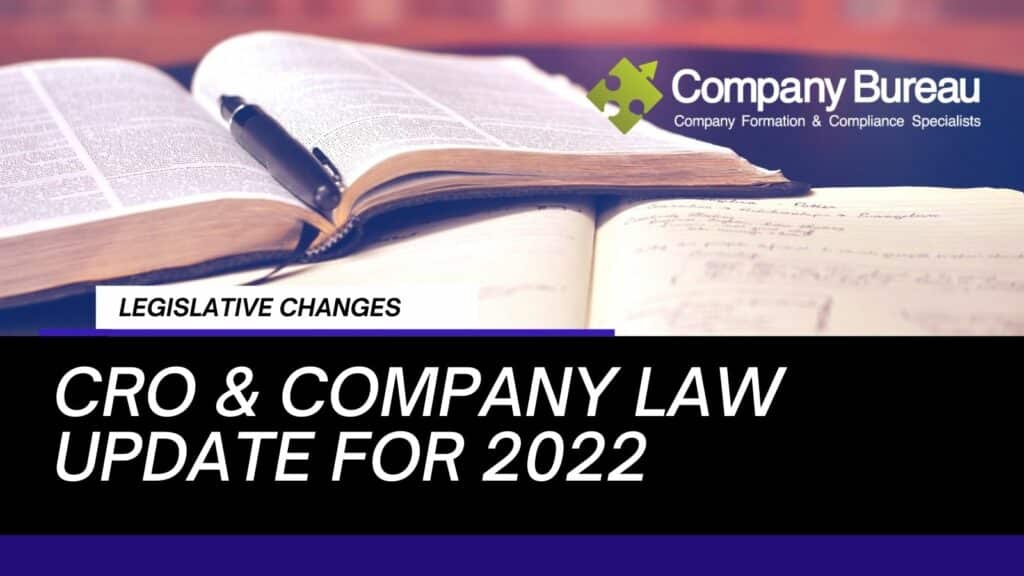By Caitlyn Buchanan, 20th January 2022 (Updated 17th June 2022)
The Companies Registration Office (CRO) is continuing to evolve with the new legislative changes that are coming down the track in 2022 and beyond. This article contains a summary of the CRO’s current and upcoming plans for 2022.
CRO Digital Transformation
It has now been over a year since the CRO implemented their new IT system to replace the CORE interface. While many of the kinks have been ironed out, we are looking forward to another planned system update in early 2022 to increase speed and capacity. The CRO has also promised to bring back useful tools such as the late penalty fee calculator and the watchlist in the latest update.
Company Bureau is pleased to announce that our lead time to incorporate new companies with the CRO is back to what it was prior to Covid, just 3-4 working days at present.
The Companies (Miscellaneous Provisions) (Covid-19) Act 2020
The Companies (Miscellaneous Provisions) (Covid-19) Act 2020 has been extended until the 31th December 2022 to permit the continuation of the following measures:
- Annual General Meetings may be held by electronic means
- Creditors’ meetings may also be conducted by electronic means
- The winding-up debt threshold remains at €50,000
- The period of protection from creditors in examinership remains 150 days
- Documents executed under seal may be executed in counterpart
Companies (Corporate Enforcement Authority) Act 2021
The CRO is working to modernise and enhance the wider corporate law regime in Ireland. The Companies (Corporate Enforcement Authority) Act 2021 was signed into law by President Higgins on the 22nd December 2021. This is described as milestone legislation that will transform the Office of the Director of Corporate Enforcement (ODCE) into a statutory and independent agency. The main function of the CEA is to encourage compliance and investigate suspected offences and non-compliance with the Companies Act 2014. This will provide additional resources to monitor and prosecute white-collar crime.
Director PPS Number Requirement
A recent series of Irish Independent articles uncovered that fraudulent companies have been registered using legitimate Irish company director identities without their knowledge or consent. The Companies Bill 2021 will make provisions that require company directors to provide their PPS numbers to the CRO when making company filings. This information is to be included at the time of incorporation, filing annual returns, and when making a change of Director or Secretary. This requirement will significantly enhance the CRO’s ability to correctly verify the identity of individual directors.
It is not yet clear what the process will be for non-resident directors without a PPS number. We expect that it will be the same or similar to the ‘BEN2 form’ requirement used for filing with the Register of Beneficial Owners in the absence of a PPS number.
General Scheme of Cooperative Societies Bill
The Department is close to finalising the General Scheme of a Cooperative Societies Bill. This legislation proposes the most far-reaching reforms to co-operatives in nearly 130 years. This will allow a modern fit-for-purpose legislative framework and is said to provide an attractive alternative to the company model for those entities who subscribe to the cooperative ethos.
Limited Partnership Bill
The Department is working to prepare another legislative reform initiative that relates to Limited Partnerships (LPs). The General Scheme of a new Limited Partnership Bill is being extended to consider issues arising from the recent publication of material relating to the Pandora Papers. The Pandora Papers allege that an address in Merrion Square is the registered office of more than 800 Irish Limited Partnerships controlled by individuals and companies based in Russia, Ukraine, and Uzbekistan.
CRO Functions and Registers
The main function of the CRO is to maintain the Register of Companies including the incorporation of new companies, registration of company post-incorporation documentation, striking-off of companies from the register, and the provision of information to the public. These registers are maintained to provide transparency on the key information of entities throughout their lifecycle.
The Register records are available to a wide range of stakeholders including those with a commercial interest such as potential investors, professional advisers, financial institutions, and suppliers. The registers allow these stakeholders to inform themselves of a company’s status before undertaking dealings. Other interested stakeholders include civil litigants and regulatory / enforcement authorities.
Register of Beneficial Owners (RBO)
The Register of Beneficial Ownership (RBO) was established to fulfil part of Ireland’s AML legislation. All new companies are legally obliged to register their beneficial ownership details within five months of registration. The RBO is now issuing summons’ for court hearings to any companies who have not registered within the timeframe. This is the first time that the RBO has taken enforcement action for non-compliance since its establishment in July 2019. Additionally, Companies will be unable to open a corporate bank account until accurate RBO information has been filed. This is because Financial institutions are considered ‘Designated Persons’ and therefore legally obliged to consult the RBO as part of their due diligence when onboarding new customers. Read more about the Consequences of RBO Non-compliance.
Conclusion
The above items are sure to bring major improvements to the regulation of corporate structures operating in the State. If you have any questions or require any assistance meeting your company obligations, please don’t hesitate to Contact Us or call +353(0)1 6461625. A member of our team would be happy to assist you.
Disclaimer This article is for guidance purposes only. It does not constitute legal or professional advice. No liability is accepted by Company Bureau for any action taken or not taken in reliance on the information set out in this article. Professional or legal advice should be obtained before taking or refraining from any action as a result of this article. Any and all information is subject to change.
